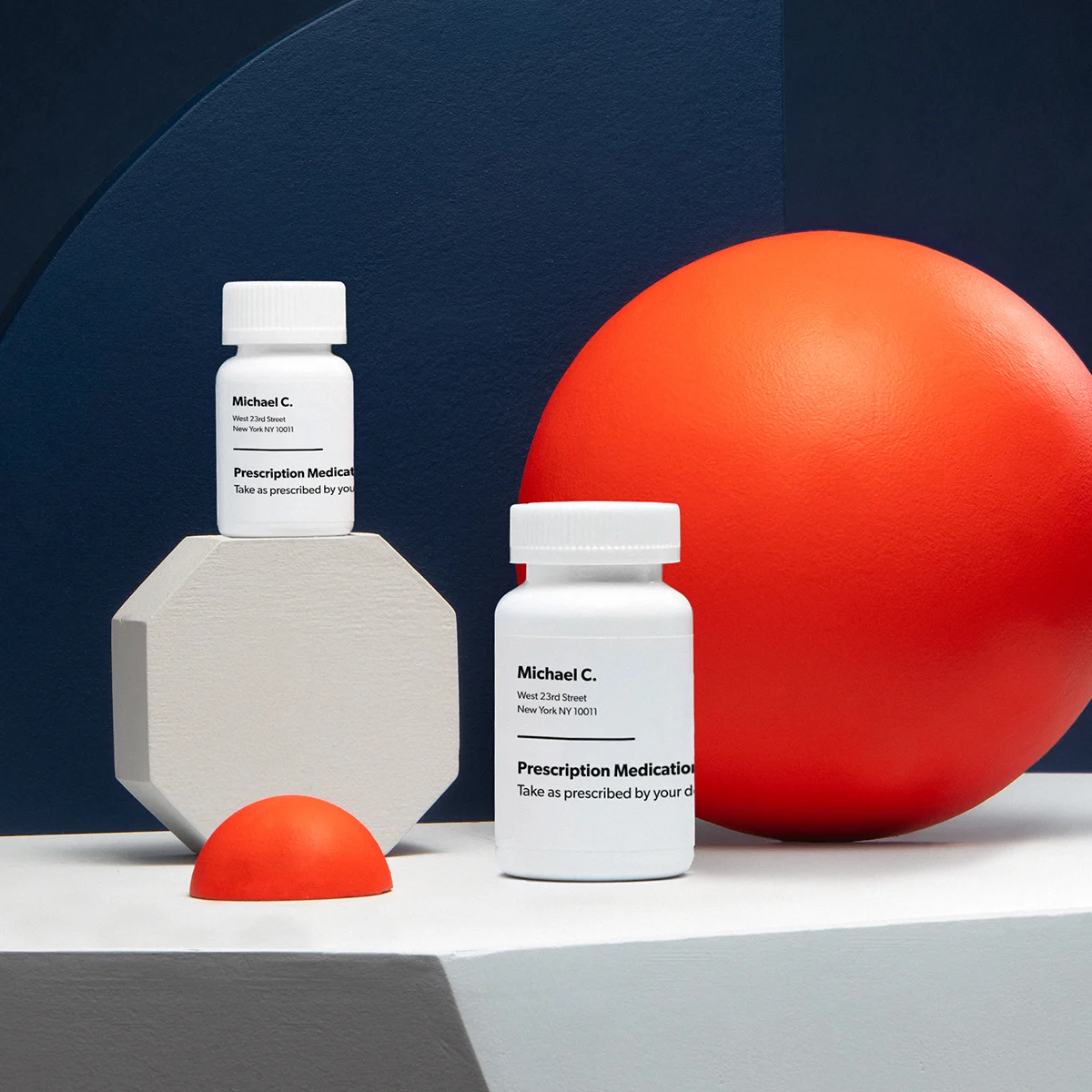Acyclovir ointment: what you need to know

Reviewed by Felix Gussone, MD, Ro,
Written by Yael Cooperman, MD, Ro
last updated: Apr 14, 2021
5 min read
Here's what we'll cover
If you’ve ever had a herpes outbreak, you’re not alone. According to the Centers for Disease Control and Prevention (CDC), about half of people aged 14 to 49 have herpes simplex 1, HSV-1 (the cold sore virus), and about 12 percent of people aged 14 to 49 have HSV-2, known as genital herpes (McQuillan, 2018). And while it can be a nuisance, showing up at all the wrong times, it’s good to know that there are treatments that can lessen or even prevent outbreaks.
One standard treatment is acyclovir ointment. In this article, we’ll give you all the details you need on acyclovir ointment and other treatment and prevention options for your herpes.
What is acyclovir ointment?
Acyclovir ointment (brand name Zovirax) is an antiviral medicine that works by stopping the herpes simplex virus from multiplying in your cells. And while this antiviral treatment can reduce the symptoms of outbreaks and shorten how long they last, there’s no permanent cure for herpes (Spruance, 2002).
Herpes viruses lay dormant inside your body and can “wake up” and cause an outbreak. While the triggers can be different for everyone and might sometimes be hard to identify, some things can increase your chances of experiencing a cold sore (Saleh, 2020).
What triggers herpes outbreaks?
If you’ve had herpes for a while, you might have identified things that cause your herpes to crop up. Some of the most well-known triggers for herpes are things that “stress” your body, like lack of sleep or even a common cold. While your body is off dealing with some other “stress,” your immune system is essentially distracted, allowing your herpes to “wake up.” That’s why they’re called cold sores or fever blisters—because they often appear when you have a cold or fever.
Other common triggers include:
Fatigue (Worrall, 2009)
Emotional stress (Worrall, 2009)
Exposure to sunlight (Rooney, 1992)
Physical stress (an injury or illness)
Hormonal changes (like getting your period)
Reduced immune function (like in people taking immune-suppressing drugs after organ transplants, in people receiving cancer treatments, or in people who have HIV)
And while herpes viruses might be best known for causing cold sores and genital herpes, there’s a whole range of herpes viruses. Different ones are responsible for causing various diseases. These include chickenpox and shingles, eye infections, mono (the “kissing disease”), and more. Classic cold sores and genital herpes are typically caused by herpes simplex virus 1 (HSV-1) or herpes simplex virus 2 (HSV-2) (Whitley, 1996).
How can I treat herpes?
You have options when it comes to treating herpes. Also, there are a few simple steps to limit the spread of herpes.
Rule #1: Make sure it’s actually herpes
Herpes tends to appear on areas of your body known as the mucous membranes. This includes all the moist spots exposed to open air (think the inside of your nose, lips, eyes, the head of the penis, and the outside of the vagina). If your outbreak is far away from your mouth (like your cheek), it might not actually be herpes. Your best bet is to be evaluated by a medical professional to make sure.
The first time you get herpes (the primary infection), symptoms often include more than just a cold sore. You might also develop signs of a cold, including fever, fatigue, achy muscles, and sore throat. Kids who get herpes for the first time might have swelling and pain in their gums, difficulty swallowing, and fevers too (Saleh, 2020).
Rule #2: Don’t touch it
Touching the sores can increase the chance that you spread the virus to other parts of your body (called autoinoculation) or to other people. Make sure to wash your hands frequently. Also, you can use a cotton swab or a finger cot (which is a small latex glove for just your finger) to apply cream or ointment to the affected area instead of your fingers to avoid spreading the virus to other regions (Beauman, 2005).
Rule #3: Use medication
At the very first onset of signs of an outbreak, you can use antiviral medications like acyclovir. Before the blisters even become visible, you might notice a tingling or burning sensation on your skin. Your healthcare provider can prescribe topical medications (like acyclovir cream or ointment) to apply to the lesion area (MedlinePlus, 2020). If you have had herpes before, a prescription should be readily available (Beauman, 2005).
It’s important to note that acyclovir ointment can be used to treat genital herpes but doesn’t typically reduce the length or severity of outbreaks. You should not apply acyclovir cream to the genitals because it may irritate these parts of your body.
If you suffer from frequent or severe outbreaks, your healthcare provider may recommend trying prescription drugs to take by mouth. There are multiple options, including acyclovir, famciclovir, and valacyclovir (brand name Valtrex). Studies have shown that oral antiviral drugs for herpes can shorten the duration of lesion episodes and pain by approximately one day (Jensen, 2004). Your healthcare provider will choose the option that’s best for you.
Valacyclovir Important Safety Information: Read more about serious warnings and safety info.
What are the side effects of acyclovir ointment?
Topical acyclovir ointment is usually well tolerated. When you use a topical ointment to treat herpes labialis, you may experience adverse effects, including burning, itching, and tingling where you apply the treatment or dry, flaky skin in that area (MedlinePlus, 2020). These side effects typically go away quickly.
In rare instances, some people may experience an allergic reaction to acyclovir. Tell your healthcare provider if you have ever experienced an allergic reaction when using other antiviral medications (like valacyclovir or famciclovir) (MedlinePlus, 2020). Signs of an allergic reaction include sudden swelling in the lips, face, or mouth, hives, itching, and difficulty breathing. If you experience symptoms of an allergic reaction, seek medical attention immediately.
Topical acyclovir ointment is for external use only (you should not swallow it). Keep this product out of reach of children and only use this product according to the medical advice you've received from a healthcare professional.
What are the alternative treatment options for oral/genital herpes?
There's an over-the-counter medication known as docosanol (brand name Abreva) that's FDA-approved for the treatment of cold sores on your lips and nose. One study showed that it shortened the duration of outbreaks from five days down to about four days and even was a little more effective than a placebo at preventing outbreaks in people who applied it at the first symptoms of a cold sore coming on (Sacks, 2001).
There are some reports that light therapy (basically the use of different types of lights or lasers) can help reduce herpes outbreaks. But so far, only a few small studies have been done to evaluate the effectiveness of these treatments. While the only adverse effects reported were pain or a burning sensation at the site treated, there weren’t enough people evaluated to be able to say for sure that the treatment worked (Lotufo, 2020).
There have been claims that all kinds of herbal products, including everything from echinacea and zinc, to the bee-derived product propolis and aloe can reduce your chances of having a herpes outbreak or reduce the duration or severity of an outbreak once you get one. Unfortunately, the research into these alternative options doesn’t suggest that they work (Perfect, 2005).
Luckily there are some things you can do, though, that might reduce your chances of having an outbreak.
How can I reduce my chance of having a herpes outbreak?
It’s important to avoid known triggers whenever possible. If you haven’t yet identified what’s been triggering your outbreaks, try to keep a diary of:
The foods you’re eating
How much sleep you get each night
How much alcohol you drink
Your stress levels
Any hormonal changes you might be experiencing
Any exposure to excessive sunlight
When you feel the first signs of a herpes outbreak (usually described as a tingling or burning sensation in the area where you typically get outbreaks), you can apply topical antiviral medications like acyclovir. Remember, you can use the ointment for genital herpes or oral herpes infections, but you should only use the cream for oral herpes (don't apply it to the genital area) (MedlinePlus, 2020).
If you have frequent outbreaks, you can talk to your healthcare provider about trying oral antiviral medications. Some studies show that they can speed healing of a herpes outbreak when compared to a placebo (Spruance, 2003).
If you are pregnant or breastfeeding, your healthcare provider will weigh the risks of taking these medications against any benefit. Herpes simplex virus infections are usually not dangerous during pregnancy, but there are some cases where they can be. A healthcare professional can decide if you need to take this drug (McCormack, 2019). Taken by mouth, antiviral medications like acyclovir have been shown to cross the placenta, but there isn't evidence of the medication causing harm so far.
DISCLAIMER
If you have any medical questions or concerns, please talk to your healthcare provider. The articles on Health Guide are underpinned by peer-reviewed research and information drawn from medical societies and governmental agencies. However, they are not a substitute for professional medical advice, diagnosis, or treatment.
Beauman, J. G. (2005). Genital herpes: a review. American Family Physician, 72 (8): 1527-34. Retrieved from https://www.aafp.org/pubs/afp/issues/2005/1015/p1527.html
Hollier, L. M., & Eppes, C. (2015). Genital herpes: oral antiviral treatments. BMJ Clinical Evidence, 4,
Retrieved from https://www.ncbi.nlm.nih.gov/pmc/articles/PMC4389798/
Jensen, L. A., Hoehns, J. D., & Squires, C. L. (2004). Oral antivirals for the acute treatment of recurrent herpes labialis. Annals of Pharmacotherapy, 38 (4):705-9. doi: 10.1345/aph.1D285. Retrieved from https://pubmed.ncbi.nlm.nih.gov/14966254/
Lotufo, M. A., Tempestini Horliana, A. C. R., Santana, T., de Queiroz, A. C., Gomes, A. O., Motta, L. J., et al. (2020) Efficacy of photodynamic therapy on the treatment of herpes labialis: A systematic review. Photodiagnosis and Photodynamic Therapy, 29 :101536. doi: 10.1016/j.pdpdt.2019.08.018. Retrieved from https://pubmed.ncbi.nlm.nih.gov/31648056/
McCormack, A. L., Rabie, N., Whittemore, B., Murphy, T., Sitler, C., & Magann, E. (2019). HSV Hepatitis in Pregnancy: A Review of the Literature. Obstetrical & Gynecological Survey, 74 (2), 93–98. Retrieved from https://pubmed.ncbi.nlm.nih.gov/30756123/
McQuillan, G., Kruszon-Moran, D., Flagg, E. W., & Paulose-Ram, R. (2018) Prevalence of herpes simplex virus type 1 and type 2 in persons aged 14–49: United States, 2015–2016. NCHS Data Brief,
MedlinePlus Drug Information: Acyclovir Topical. (2016, June 15). The NIH, US National Library of Medicine. Retrieved Jan. 5, 2021 from https://medlineplus.gov/druginfo/meds/a606001.html
NIH U.S. National Library of Medicine. (2018). Acyclovir ointment. DailyMed . Retrieved from https://dailymed.nlm.nih.gov/dailymed/lookup.cfm?setid=ce3d5e8b-9401-40be-8ce7-4ea42113f4ab
Perfect, M.M., Bourne, N., Ebel, C., & Rosenthal, S. L. (2005) Use of complementary and alternative medicine for the treatment of genital herpes. Herpes, 12 (2):38-41. Retrieved from https://pubmed.ncbi.nlm.nih.gov/16209859/
Rooney, J.F., Strauss, S. E., Mannix, M. L., Wholenberg, C. R., Banks, S., Jagannath, S., et al. (1992). UV light-induced reactivation of herpes simplex virus type 2 and prevention by acyclovir. Journal of Infectious Disease, 166 (3):500-6. doi: 10.1093/infdis/166.3.500. Retrieved from https://pubmed.ncbi.nlm.nih.gov/1323616/
Sacks, S. L., Thisted, R. A., Jones, T. M., Barbarash, R. A., Mikolich, D. J., Ruoff, G. E., et al. (2001). Docosanol 10% Cream Study Group. Clinical efficacy of topical docosanol 10% cream for herpes simplex labialis: A multicenter, randomized, placebo-controlled trial. Journal of the American Academy of Dermatology, 45 (2):222-30. doi: 10.1067/mjd.2001.116215. Retrieved from https://pubmed.ncbi.nlm.nih.gov/11464183/
Saleh, D., Yarrarapu, S. N. S., & Sharma, S. (2020). Herpes Simplex Type 1. StatPearls [Internet]. Retrieved Jan. 5, 2021 from https://www.ncbi.nlm.nih.gov/books/NBK482197/
Spruance, S. L., Jones, T. M., Blatter, M. M., Vargas-Cortes, M., Barber, J., Hill, J., et al. (2003). High-dose, short-duration, early valacyclovir therapy for episodic treatment of cold sores: results of two randomized, placebo-controlled, multicenter studies. Antimicrobial Agents and Chemotherapy, 47 (3), 1072–1080. Retrieved from https://www.ncbi.nlm.nih.gov/pmc/articles/PMC149313/
Spruance, S. L., Nett, R., Marbury, T., Wolff, R., Johnson, J., & Spaulding, T. (2002). Acyclovir cream for treatment of herpes simplex labialis: results of two randomized, double-blind, vehicle-controlled, multicenter clinical trials. Antimicrobial Agents and Chemotherapy, 46 (7):2238-43. doi: 10.1128/aac.46.7.2238-2243.2002. Retrieved from https://pubmed.ncbi.nlm.nih.gov/12069980/
Worrall, G. (2006). Herpes labialis. BMJ Clinical Evidence, 296 (8), 964-9731. doi: 10.1001/jama.296.8.964. Retrieved from https://pubmed.ncbi.nlm.nih.gov/16926356/
Whitley, R. J. (1996). Herpesviruses. In: Baron S, editor. Medical Microbiology. 4th edition. Galveston (TX): University of Texas Medical Branch at Galveston; Chapter 68. Retrieved from https://www.ncbi.nlm.nih.gov/books/NBK8157/
Xu, F., Sternberg, M. R., Kottiri, B. J., McQuillan, G. M., Lee, F. K., Nahmias, A. J., et al. (2006). Trends in herpes simplex virus type 1 and type 2 seroprevalence in the United States. JAMA, 296 (8), 964-73. doi:10.1001/jama.296.8.964. Retrieved from https://pubmed.ncbi.nlm.nih.gov/16926356/










